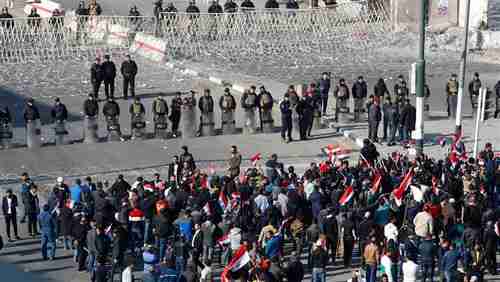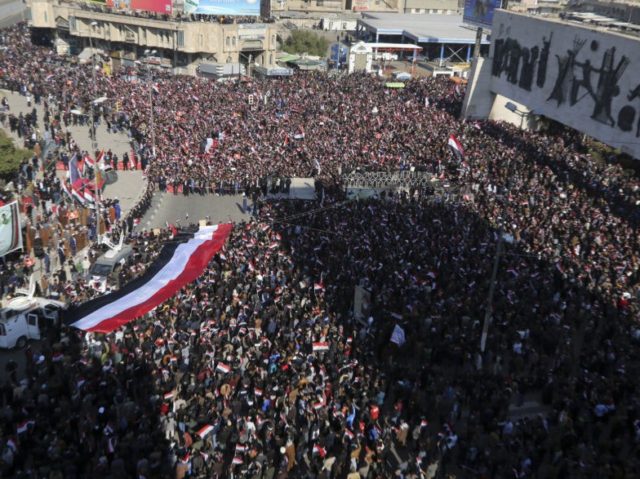This morning’s key headlines from GenerationalDynamics.com
- Iraq: Supporters of al-Sadr and al-Maliki turn again to violence in Baghdad
- Iraq’s army poised to begin Battle of Mosul in the west
Iraq: Supporters of al-Sadr and al-Maliki turn again to violence in Baghdad

Security forces stand guard as supporters of Iraqi cleric Muqtada al-Sadr protest on Saturday. The protests turned violent later. (AFP)
Seven people were killed on Saturday during protests that turned violent after thousands of people flooding into central Baghdad to protest Iraq government corruption.
Several hours later, at least seven Katyusha rockets were launched from northern Baghdad, landing in the heavily protected Green Zone.
Powerful Shia cleric Moqtada al-Sadr – whom some of you may remember as playing a highly contentious role in the Iraq war ten years ago, challenging US forces with his Mahdi militias – called the protests. He’s very closely linked to the clerics in Iran.
Al-Sadr’s political enemy is former prime minister Nouri Al-Maliki. He became prime minister in 2006 with America’s help and remained in office for eight years. In 2008, al-Maliki ordered the Iraqi army to clean out the city of Basra, the stronghold of al-Sadr’s militias. Some of you may remember al-Maliki as the person in charge when President Obama withdrew all American forces from Iraq in December 2011. Al-Maliki’s first action was to purge Sunnis from Iraq’s government.
Al-Maliki’s reign was so destructive and divisive to Iraqi society that he was forced out in 2014. The current prime minister is Haider al-Abadi, who has been trying to bring the country together again, but who is being charged by al-Sadr with corruption, and with supporting the return of al-Maliki in elections scheduled for September. At the same time, al-Abadi is head of the Iraqi army which is attempting to recapture Mosul from the so-called Islamic State (IS or ISIS or ISIL or Daesh).
The protests and violence between supporters of the al-Sadr and al-Maliki are Shia versus Shia Muslim violence. That violence is expected to increase as the September elections approach. But one-third of Iraq’s population are Sunni Muslims, and their role in the September elections is still to be fully defined. Middle East Eye and BBC and Washington Post
Related Articles
- Arrest warrant for Iraq’s VP plunges Iraq’s government into crisis (21-Dec-2011)
- Iraq’s Moqtada al-Sadr says attack Americans, not each other (09-Apr-2007)
- Iraqi Sunnis are turning against al-Qaeda in Iraq (01-Apr-2007)
Iraq’s army poised to begin Battle of Mosul in the west
Iraq’s prime minister Haider al-Abadi had hoped that the army, heavily backed by US and coalition warplanes and logistics, would have completed its recapture of Mosul from ISIS by the end of 2016, but the battle is taking far longer than expected. According to Iraq’s government, east Mosul with a population of 500,000 has been taken and cleared of ISIS fighters, and the army is now poised to begin a decisive battle to retake western Mosul, with a population of 750,000.
The urban style fighting is extremely nasty. ISIS has laid hundreds of booby-trapped explosive devices in buildings throughout the city. The ISIS fighters move around in tunnel systems that have been built in preparation for this battle.
The government now estimates that the Battle of Mosul will take about two more months. Air Force Times and CBS News and Washington Post (13-Jan)
Related Stories
- Iraq, ISIS and the West prepare for the Great Battle for Mosul to begin soon (01-Oct-2016)
- Iraq in major crisis after catastrophic fall of Mosul to ISIS (11-Jun-2014)
- Kurds battle ISIS for strategic Mosul Dam in Iraq (18-Aug-2014)
KEYS: Generational Dynamics, Iraq, Iran, Muqtada al-Sadr, Nouri Al-Maliki, Haider al-Abadi, Baghdad, Mosul, Islamic State / of Iraq and Syria/Sham/the Levant, IS, ISIS, ISIL, Daesh
Permanent web link to this article
Receive daily World View columns by e-mail

COMMENTS
Please let us know if you're having issues with commenting.